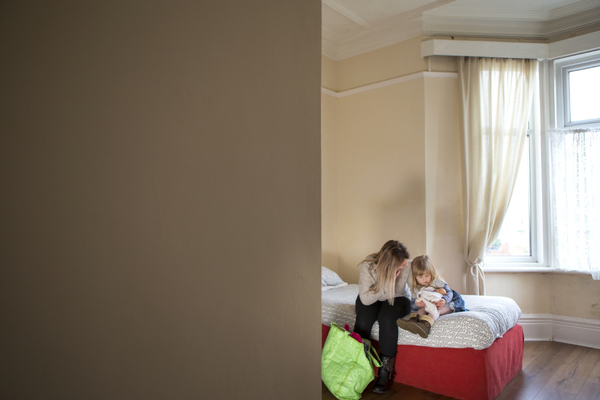You are viewing 1 of your 1 free articles
Intimidation points are open to abuse and should be abolished
Points awarded for intimidation under Northern Ireland’s allocations system are outdated, disproportionate and should be scrapped, says Justin Cartwright
Currently, more than 23,500 households on the common waiting list – used by the Northern Ireland Housing Executive (NIHE) and all Northern Ireland housing associations – are considered to be in housing stress.
Almost 12,000 of these households are homeless and eligible for full assistance under the law.
The Department for Communities in Northern Ireland is proposing changes to the way social homes are allocated, partly to create “a more accurate waiting list that reflects current housing circumstances”.
One of the drivers behind this change to our points-based system is the experience of “intimidation points”.
Currently, such points are awarded to people who are intimidated out of their homes, but only in limited circumstances.
The intimidation has to take the form of a terrorist, racial or sectarian attack.
It can also be an attack motivated by an individual’s disability or sexual orientation, or be carried out by certain perpetrators of anti-social behaviour.
Furthermore, it has to destroy or seriously damage an applicant’s home, or create a serious and imminent risk of death or serious injury – this is a ‘high bar’ that limits the number of applicants who are awarded the points.
“Regular sectarian attacks took place where these people were intimidated out of their homes.”
Priority for intimidation was introduced decades ago due to violence during the Troubles. As the civil disturbances intensified, Protestants and Catholics began moving to single-identity ‘safe areas’.
People who stayed behind could become religious minorities in their neighbourhoods – regular sectarian attacks took place where these people were intimidated out of their homes by paramilitaries and gangs from the other ethno-religious community.
From its earliest days, the Northern Ireland Housing Executive maintained an emergency housing list.
People could join this list if they were already out of their homes and the police confirmed intimidation.
Next year marks the 20th anniversary of the Good Friday Agreement and the scale of sectarian violence that occurred during the Troubles is gratefully a thing of the past.
But high priority for re-housing due to intimidation remains.
A quick look at the types of intimidation over the three years from 2013/14 to 2015/16 shows that sectarian attacks now account for just 6% of cases. The main category is paramilitary or terrorist attacks, at 77%.
“The level of priority given to intimidation cases is very disproportionate.”
All intimidation is wrong and must be condemned. And these kinds of attacks certainly warrant priority for rehousing, so what is the problem?
First, the level of priority given to intimidation cases is very disproportionate. An applicant who experiences the above types of intimidation receives 200 additional points – on top of 70 points for homelessness and 20 points for violence – totalling 290 points.
In comparison, an applicant who is accepted as homeless due to domestic violence receives just 90 points. There were 2,300 such applicants over the three years from 2013/14 to 2015/16, while there were 1,200 intimidation cases.
Second, intimidation points are open to abuse and there are concerns in the housing sector that they are being misused to secure top priority for rehousing.
The amount of points awarded ensures that applicants gain priority for rehousing over almost every other household on the waiting list. Applicants can also apply for an emergency grant of more than £700.
“There are concerns in the housing sector that intimidation points are being misused to secure top priority for rehousing.”
Northern Ireland’s Department for Communities is proposing to abolish intimidation points as part of its review.
We recently polled Chartered Institute of Housing members in Northern Ireland for their views on the review and 11% of members responded.
Nine in 10 respondents said intimidation points should be abolished, commenting that “they are outdated and regularly abused” and “many applicants are getting housed ahead of people who are in more housing stress”.
A fairer and more proportionate way to deal with intimidation is to remove all people who experience intimidation from danger and offer alternative accommodation on an emergency basis, and apply the rules of the selection scheme without intimidation points to determine priority for rehousing.
Northern Ireland’s allocations system is designed to prioritise people who are homeless. Intimidation cases should be prioritised the same as in cases of domestic violence, harassment, disputes and other reasons for homelessness.
Justin Cartwright, policy and public affairs manager, Chartered Institute of Housing Northern Ireland











